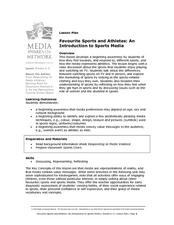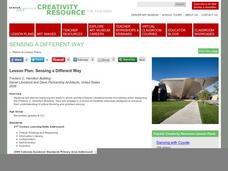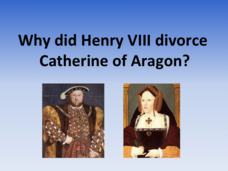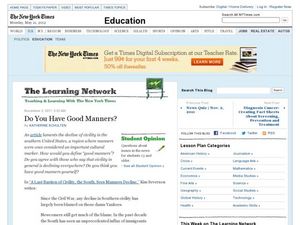Curated OER
Favorite Sports and Athletes: an Introduction to Sports Media
Even young children watch sports and like team logos and products. It's never too early to think critically about what's onscreen. This exercise develops awareness that media communicate values (i.e. who participates in sports and who...
Curated OER
Lesson: Creating a Superhero Sculpture
Indian art depicts an amazing pantheon of gods and goddesses, each having interesting powers and purposes. Young art historians use the provided images to analyze a carved sculpture of a monkey-god. They then brainstorm the attributes...
Curated OER
Do Presidential Candidates Need to Be Good Debaters?
Blogs can be a good way for learners to engage in writing, critical thinking, and social media in a formal way. The New York Times has provided learners age 13-18 with an article, background information, and several prompts to get them...
Curated OER
Lesson: Functional Fashion
Upper graders scrutinize the clothing worn by the vaqueros in James Walker's painting, Cowboys Roping a Bear. They pay close attention to the period style as well as the clothing functionality in the given context. Kids then design their...
Curated OER
Lesson: Stepping into the Past
How have things changed from the past until now? Young art historians examine a screen painted in Mexico during the 1700s. They discuss the differences between a garden party then and now. They then write a journal entry about the party...
Curated OER
Lesson: From the Horse's Mouth
Kids turn a critical eye on a wooden horse that was carved in ancient China. They analyze the horse as far as its purpose, historical significance, and artistic style, then write a story from the horse's perspective.
Curated OER
Lesson: Text Messages
Can a neon sign be considered art? Kids consider two different works that use neon text as the basis for conveying artistic social messages. They then analyze a truism from Jenny Holzer's web site that holds meaning to them personally....
Curated OER
Lesson: Sensing a Different Way
Problem solving and creative thinking are top priority in an interesting lesson. Learners explore how they can think creatively to use four common objects in three different ways, they discuss senses and using senses differently to...
Curated OER
Lesson: Urs Fischer: Reviving the Past Art Movements
Seven major abstract art movements are analyzed by learners in groups. Each group analyzes various works by determining which work belongs to which movement. They then read Flatland, engage in an art and literary analysis discussion,...
Curated OER
Lesson Plan: My Space
Everyone has a special, personal space; here kids will create a collage that reflects that space. They analyze the painting Soup Tureen and Apple, review two poems, and then conceptualize a personal space through art.
Curated OER
Lesson: Looking Closer: The Artwork of Shinique Smith
A critical discussion regarding the nature of Shinique Smith's second-hand clothing art is the foundation for the lesson. Critical thinkers fully analyze the meaning behind her work, taking close consideration of where the clothing came...
Curated OER
Nov. 2, 1976 | Carter Defeats Ford in Presidential Election
After reading about the presidential race in 1976, learners think critically about presidential legacy. They read all of the provided background information, related New York Times articles, and then respond to a writing prompt via blog...
Curated OER
Lesson Plan: What We Value
How have values changed? How does our society influence our choices? Two great questions lead this discussion about food production, history, and cause-and-effect relationships. Pupils analyze a limestone relief from Assyria, research...
Curated OER
Lesson: Taking Risks & Making Comparisons
Kids are asked how an Indian mandala was made. They devise a hypothesis and then use colored sand to test if their guesses were correct. They document the experience, examine a mandala, and write a comparative piece about the differences...
Curated OER
Lesson Plan: Sensory Exploration
Using their keen eyes and ears, learners build story observation skills which they will use to create sensory detail in their art. They note all of the things they observed on a walk, categorize them by sense, and then use the same skill...
Curated OER
Lesson: David Goldblatt: Structures and Normativity, looking at Photography
Art can be a vehicle for social change and cultural expression. Upper graders examine the art of photographer David Goldblatt, as it pertains to apartheid, South Africa, and the AIDS epidemic. Discussion questions and image links are...
Curated OER
A Symbol of Protection
Young art critics consider symbolic protection as it has been used in various cultures around the globe. They view body art from the Marquesas Islands, looking for animals, letter, shapes, and patterns. They compare and contrast body art...
Curated OER
It's All About the Brushstrokes
Afte analyzing the painting, Autumn Poplars by Camille Pissarro, learners explore self-expression through painting techniequs. They disucss the piece, consider Impressionist painting, and then create masterpieces that represent a...
Curated OER
Lesson Plan: How Coyote Came to Shuffle Off to Buffalo
Creative kids read, discuss, play-act, and sketch to examine the cultural significance of Old Man Coyote. They listen to several stories involving Coyote, analyze the Harry Fonseca painting Shuffle Off to Buffalo, and write Coyote...
Curated OER
Why Did King Henry VIII Divorce Catherine of Aragon?
Why did King Henry divorce Catherine of Aragon, and how did he make divorce possible? Young historians will read through each informational slide to learn the story of Catherine of Aragon, King Henry, and Anne Boleyn. They will then...
Curated OER
Building a School Model: An Academic Challenge
First and second graders explore aspects of design. They discuss and design the ideal classroom building complete with window and door placement. Additionally, students observe and note features found in neighboring classrooms as...
Curated OER
Reading Comprehension 5: Level 9
The piranha is the subject of a reading passage that is sure to engage your learners in a reading comprehension exercise. Pupils must employ multiple strategies to answer the questions based on the passage. Of particular value is the...
Curated OER
Lesson: Urs Fischer: Your Choice: Reality or Illusion?
Young analysts write a comparative essay, but about what? They compose a paper based on several critical discussion about reality and illusion, and how both are blurred in art. They analyze several theatre pieces that exemplify Brechtian...
Curated OER
Do You Have Good Manners?
Who cares about manners anyway? According to the New York Times, Mrs. Mason does. Learners read and consider an article which addresses the decline of manners and the impact it has on society. They answer seven critical thinking...

























